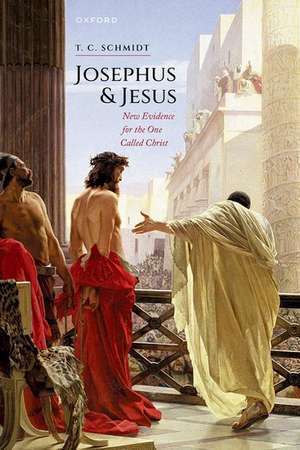Josephus and Jesus: New Evidence for the One Called Christ
Autor T. C. Schmidten Limba Engleză Hardback – 3 iun 2025
Preț: 595.54 lei
Preț vechi: 851.83 lei
-30% Nou
Puncte Express: 893
Preț estimativ în valută:
113.97€ • 118.55$ • 94.09£
113.97€ • 118.55$ • 94.09£
Carte nepublicată încă
Doresc să fiu notificat când acest titlu va fi disponibil:
Se trimite...
Preluare comenzi: 021 569.72.76
Specificații
ISBN-13: 9780192866783
ISBN-10: 0192866788
Pagini: 336
Ilustrații: 14 Illustrations
Dimensiuni: 156 x 234 mm
Editura: OUP OXFORD
Colecția OUP Oxford
Locul publicării:Oxford, United Kingdom
ISBN-10: 0192866788
Pagini: 336
Ilustrații: 14 Illustrations
Dimensiuni: 156 x 234 mm
Editura: OUP OXFORD
Colecția OUP Oxford
Locul publicării:Oxford, United Kingdom
Recenzii
An extraordinary scholarly achievement, this book has the potential of redefining the discussion of the Testimonium Flavianum and its value as a source of historical information. With impressive philological acumen, Schmidt suggests a compelling reading of the text that confirms its authenticity. His argument for the existence of a surprisingly close connection between Josephus and those involved in Jesus' execution should be taken seriously by all historical Jesus scholars.
Schmidt's book makes an astonishingly new intervention into what had seemed to be a settled consensus on Josephus and Jesus. On the one hand, his erudite study models what it means to take reception seriously. On the other hand, he powerfully demonstrates the value of bringing such perspectives back to bear on our reconstruction of original meanings and settings. Scholars and students of the Jesus movement and early Jewish/Christian relations will need to grapple with his compelling argument and its ramifications.
Prof. Schmidt offers a thorough and sophisticated analysis of the Testimonium Flavianum, a first-century report about Jesus whose authenticity has often been doubted. Schmidt convincingly shows that for students of the early reaction to Jesus, Josephus can no longer be ignored.
In this fascinating and subtly provocative work, Schmidt patiently deploys enormous erudition to make a compelling case for the authenticity of the famous Testimonium Flavianum. The result is a gripping read and triumph of careful philology that will change views of the importance and reliability of this long-debated passage. It certainly changed mine.
The argument of this book is potentially of greater significance for the study of the historical Jesus than the announcement of any of the apocryphal gospels that have made headlines. Here we have a bold new argument undergirded by meticulous research on a well-known text. How could Josephus in his Antiquities sound so Christian when describing the life of Jesus Christ? Schmidt not only makes a strong case for the authenticity of Josephus' testimony to Jesus, but also shows that we have been misreading it. Earlier interpreters were less inclined to view Josephus' words as entirely positive. To cap it all, Schmidt argues that Josephus probably received information about Jesus from those who were at his trial. This book should be widely read and discussed.
Schmidt's book makes an astonishingly new intervention into what had seemed to be a settled consensus on Josephus and Jesus. On the one hand, his erudite study models what it means to take reception seriously. On the other hand, he powerfully demonstrates the value of bringing such perspectives back to bear on our reconstruction of original meanings and settings. Scholars and students of the Jesus movement and early Jewish/Christian relations will need to grapple with his compelling argument and its ramifications.
Prof. Schmidt offers a thorough and sophisticated analysis of the Testimonium Flavianum, a first-century report about Jesus whose authenticity has often been doubted. Schmidt convincingly shows that for students of the early reaction to Jesus, Josephus can no longer be ignored.
In this fascinating and subtly provocative work, Schmidt patiently deploys enormous erudition to make a compelling case for the authenticity of the famous Testimonium Flavianum. The result is a gripping read and triumph of careful philology that will change views of the importance and reliability of this long-debated passage. It certainly changed mine.
The argument of this book is potentially of greater significance for the study of the historical Jesus than the announcement of any of the apocryphal gospels that have made headlines. Here we have a bold new argument undergirded by meticulous research on a well-known text. How could Josephus in his Antiquities sound so Christian when describing the life of Jesus Christ? Schmidt not only makes a strong case for the authenticity of Josephus' testimony to Jesus, but also shows that we have been misreading it. Earlier interpreters were less inclined to view Josephus' words as entirely positive. To cap it all, Schmidt argues that Josephus probably received information about Jesus from those who were at his trial. This book should be widely read and discussed.
Notă biografică
T. C. Schmidt (Yale PhD) has broad interests that touch upon the historical Jesus, the formation of the New Testament, the history of Christianity in Syriac and Arabic contexts, and the origin of Christmas. Notably, Professor Schmidt has produced peer-reviewed translations from Latin, Greek, Syriac, and Arabic texts. These include works from ibn Katib Qaysar (a twelfth-century Arabic Christian writer), Isho'dad of Merv (a ninth-century Syriac Bishop), and Hippolytus of Rome (a third-century theologian). His books have been published with academic presses such as Cambridge, Fordham, Catholic University, and Gorgias. He currently teaches at Fairfield University.
